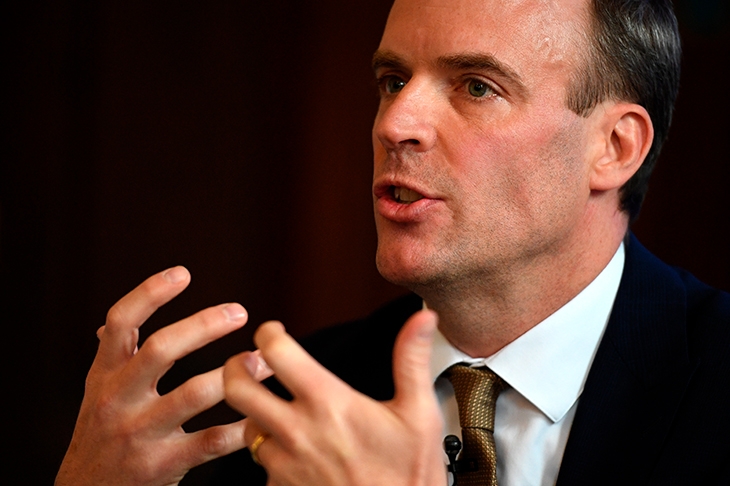The government’s promised ‘pathway to citizenship’ to Hong Kong people is wonderful, but has the Foreign Office arranged a get-out clause? Last week, Dominic Raab told parliament that ‘if China enacts the [proposed new security] law, we will change the arrangements for British National (Overseas) passport holders in Hong Kong’. He added, however, that ‘We do not oppose Hong Kong passing its own national security law’. Behind this lies the fact that the Basic Law of Hong Kong, arising from the Sino-British Agreement of 1984, prescribes that Hong Kong ‘shall enact its own laws to prohibit any act of treason, secession, sedition or subversion against the Central People’s Government’. So far, it has not done so. Hence Beijing’s recent threat. But if, thus threatened, the Hong Kong Legislative Council (LegCo) does pass the security law demanded, the outward form will have been observed and Beijing’s wish will have become Hong Kong’s ‘own laws’. Then Britain’s promise of citizenship would appear to be void. Since only half the seats in LegCo are directly elected, Beijing-backers will surely maintain control even if the democrats triumph in September’s elections. Is this what Mr Raab is not quite telling us?
Sonita Alleyne, the Master of Jesus College, Cambridge, issued a passionate ‘personal message’ about the killing of George Floyd on her college’s website: ‘The message posted on the College Twitter account “If one man can’t breathe, we all can’t breathe” were my words,’ she revealed. ‘Be angry at this moment.’ Ms Alleyne’s message was published on 5 June — the day, in 1989, when the world watched the famous pictures of a young man confronting a line of tanks in Tiananmen Square. Soon 10,000 Chinese could not breathe, being dead. I have recently drawn attention to the adulatory approach of the college’s China Centre to the regime of the Chinese Communist party, which this year banned commemorations of the killings. Ms Alleyne comments readily on the events in Minneapolis, but has forbidden dons to speak to the press about her college’s relationship with China.
On Tuesday morning, I was invited on the Today programme to debate with Lionel Barber, ex-editor of the Financial Times, the strange story of the New York Times and the Republican Senator Tom Cotton. Headlined ‘Send in the Troops’, Senator Cotton’s piece supported President Trump’s threat to restore order in American cities. So great were the protests from staff and readers that the publisher and editor decided it should not have been published. The op-ed page editor resigned. The BBC’s phone connection started garbling, so I never said an audible word. But before it disappeared altogether, I did hear Lionel talking about the ‘failure of process’ which led to publishing. There probably were such failures, perhaps made forgivable by the physical problems of lockdown (which also caused failure of process on Today). But that is an evasion. The real reason for the rumpus was that the paper had run a controversial opinion piece by a Trump supporter. Most editors dread articles by politicians because they can be so dull; but a broadsheet should run them when they represent an important view at an important time, including one opposed to the paper’s. Mr Cotton, a prominent Senator with a military background, fitted that bill. The paper’s internal conflict was interestingly expressed in tweets by Bari Weiss, a New York Times writer. She splits the paper between the ‘(mostly young) wokes; and the (mostly 40+) liberals’. The latter made the mistake, she says, of thinking the young they had appointed shared their ‘civil libertarianism’. They don’t. The ‘New Guard’ believe in what they call ‘“safetyism”, in which the right of people to feel emotionally and psychologically safe trumps what were previously considered core liberal values, like free speech’. A Committee of Public Safety! That spells death to journalism.
On 18 June (which, we must overlook, is Waterloo Day), President Emmanuel Macron will visit London to celebrate the 80th anniversary of General de Gaulle’s famous ‘Appel’ to the French people made, thanks to Winston Churchill, via the BBC (‘France is not alone! She is not alone!’). He will meet the Prince of Wales and the Prime Minister, and present London with the Legion d’Honneur for its wartime role helping the Free French. I gather there is hesitation in Downing Street about Boris Johnson joining the President at Churchill’s statue in Parliament Square. This seems a mistake: it would be a good way of re-honouring the war leader after some Black Lives Matter protestors insulted him. It would also be good for the Mayor, Sadiq Khan, who may receive the decoration on behalf of his city, to be reminded of a statue that matters.
Taro Aso, finance minister and former prime minister of Japan, attributes his country’s low Covid-19 mortality rate (900 deaths in a population of 126 million) to its social manners (‘mindo’). A controversial remark, apparently, but it feels right. With a disease often carried by touch, those who bow rather than shake hands and discipline their social contact are at a great advantage. I once met Mr Aso on the grouse moor of Henry Keswick, the great China merchant. His own manners in this unlikely setting were charming — orientally courtly, but with a twinkle in his eye. He had never shot grouse before, but had been in the Japanese Olympic skeet shooting team. Although wearing a dark office suit instead of tweed, Mr Aso stood in his butt with modest confidence. He shot every grouse that approached, and a hare. There were five drives in the day but, when invited to continue after the first, he said: ‘No thank you. Too cold. Back to house.’
Until the lockdown, I rarely read sports pages. Now I play a ‘Spot the Ball’ competition in them every day: are there any balls to spot? Naturally, the picture supply has diminished. Some days, there are no pictures of a ball. It is like war reporting without pictures of guns.







Comments